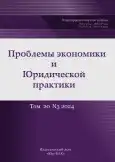Цифровая грамотность: анализ результатов государственной политики (на примере стран Азии)
- Авторы: Яковлева А.В.1, Конюховский П.В.1
-
Учреждения:
- Российский государственный педагогический университет им. А. И. Герцена
- Выпуск: Том 20, № 3 (2024)
- Страницы: 25-39
- Раздел: Публично-правовые (государственно-правовые) науки
- URL: https://journal-vniispk.ru/2541-8025/article/view/263746
- DOI: https://doi.org/10.33693/2541-8025-2024-20-3-25-39
- EDN: https://elibrary.ru/RHUGCV
- ID: 263746
Цитировать
Аннотация
Цифровая грамотность в условиях глобальной трансформации экономики и общества стала важнейшим фактором социально-экономического роста. Развитие технологий радикально изменило скорости информационного обмена, что привело к принципиальным сдвигам в общественных отношениях. Качественно обновились условия рынка труда. На первый план вышли цифровые навыки и компетенции. В этом контексте цифровая грамотность становится ключевым фактором личностного развития. В современной ситуации возрастает актуальность исследований результатов государственных мер, направленных на повышение цифровой грамотности, как в сфере права, так и в социально-экономической сфере. Настоящая статья посвящена методам анализа фундаментальных результатов государственной политики. В качестве информационной базы выступили нормативно-правовые документы Индии (законопроект «О праве на цифровую грамотность», декабрь 2022 г.), Индонезии («Национальная программа цифровой грамотности», 2021 г.) и Сингапура («План цифровой готовности», 2018 г.). В результате исследования удалось выявить роль государственных мер в сфере права, ведущие факторы процессов эволюции цифровой грамотности населений, а также страновую специфику данных процессов.
Полный текст
Открыть статью на сайте журналаОб авторах
Анна Валерьевна Яковлева
Российский государственный педагогический университет им. А. И. Герцена
Автор, ответственный за переписку.
Email: yeif@mail.ru
ORCID iD: 0000-0001-9219-9405
SPIN-код: 4603-0174
доктор экономических наук, профессор, доцент
Россия, г. Санкт-ПетербургПавел Владимирович Конюховский
Российский государственный педагогический университет им. А. И. Герцена
Email: kon_pv@mail.ru
ORCID iD: 0000-0002-2940-1049
SPIN-код: 9637-6933
доктор экономических наук, профессор
Россия, г. Санкт-ПетербургСписок литературы
- Яковлева А.В. Правовая поддержка стратегии повышения цифровой грамотности: опыт Китая / А.В. Яковлева // Пробелы в российском законодательстве. —2023. —Т. 16. №7. —С. 024–031. doi: 10.33693/2072-3164-2023-16-7-024-031. EDN: RMTGLV.
- Яковлева А.В., Нечаева Т.В., Степанова Т.В. Правовая основа образовательной отрасли, определяющая стандарты цифровой грамотности педагогов Китайской Народной Республики / А.В. Яковлева, Т.В. Нечаева, Т.В. Степанова // Проблемы экономики и юридической практики. —2023. Т. 19. № 5. —С. 50–59. EDN: PXWMVW.
- Ei C.H., Carol S. Towards a Unified Framework for Digital Literacy in Singapore.—Institute of Policies Studies Working Papers No. 39. —April, 2021. —[Электронный ресурс] —Режим доступа: URL: https://lkyspp.nus.edu.sg/docs/default-source/ips/working-paper-39_towards-a-unified-framework-for-digital-literacy-in-singapore.pdf (дата обращения: 01.05.2024).
- Gilster P. Digital literacy. —Wiley Computer Publishing, New York. —1997.
- Indradi A.H., Hendryanto Y.D. Analisis hukum terhadap instrumen kebijakan pemerintah dalam mewujudkan akselerasi literasi digital // Prosiding Seminar Nasional Program Studi Ilmu Pemerintahan Universitas Galuh Tahun 2022. —Hal. 218–233.
- Libago Mary Ann Ronith P., Jajalla Jobell B., Royo James C. Assessing the digital literacy among freshmen college students: a descriptive-comparative study // EPRA International Journal of Multidisciplinary Research (IJMR) —Peer Reviewed Journal. —Volume: 10. —Issue: 1. —January, 2024. —P. 468–473.
- Yılmaz İ., Akel A., Bayraktar G., Demirkaya H. Digital Literacy and Education in Turkey // International Social Sciences Studies Journal. —2023. —Vol:9, Issue:116. —P. 8633–8639. DOI: http://dx.doi.org/10.29228/sssj.725 90.
- Zahra N. Meningkatkan Inklusi dalam Indeks Literasi Digital Nasional: Dari Pengukuran hingga Pemberdayaan. —Ringkasan Kebijakan No. 19. —Agustus, 2023. —[Электронный ресурс] —Режим доступа: URL: https://repository.cips-indonesia.org/media/publications/565200-meningkatkan-inklusi-dalam-indeks-litera-f5c86e8a.pdf (дата обращения: 01.05.2024).
Дополнительные файлы





















